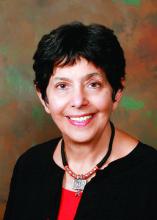By the time physicians turn 65 years old, more than 75% of those in low-risk specialties such as pediatric dermatology have been named in a lawsuit, compared with 99% of those in high-risk specialties such as obstetrics and gynecology, according to Ilona J. Frieden, MD.
“We all know there’s a possibility that we could get named in a lawsuit,” she said during the virtual annual meeting of the Society for Pediatric Dermatology. “It could happen to any of us. Lawsuits are not uncommon, but few of us have received any kind of training for how to handle them.”
Based on her experience being named in a malpractice/wrongful death lawsuit, Dr. Frieden, who has had a nearly 4-decade career as a pediatric dermatologist at the University of California, San Francisco, offered the following tips for clinicians facing practice-related litigation:
First, immediately inform the risk management representatives at your institution or your malpractice insurance carrier. “Tell them about the situation and arrange to talk to a lawyer,” she advised.
Second, prepare to confront a range of emotions. “Depending on the circumstances, [that could be] fear, anger, dread, and defensiveness,” said Dr. Frieden, professor of dermatology and pediatrics, at UCSF. “What surprised me was this sort of physical sensation. I felt like I had been kicked in the stomach. In retrospect, this is not such a surprising finding. It really is an assault on your professional identity, so it made sense to me as I thought about this.”
Third, slow yourself down. The litigation process typically takes 2-5 years, “so this is a marathon; this is not a sprint,” she said. “While you are waiting you will be told, ‘Don’t discuss this case with anyone.’ While this may be true for the specific details of the case, it isn’t true about what you are feeling and how this affects you. You can and you should talk to a trusted friend, to a spouse, or even to a therapist so that you can process what you’re going through and not feel alone.”
Fourth, try to focus on the patients that you help. Having a patient in your pediatric dermatology practice die “is a rare event,” she said. “Try to not let such an event define you in terms of your professional identity. Meanwhile [remember that] you’re helping lots and lots of people.”
Fifth, be humble, both for yourself and the experts you might turn to for advice when you’re facing a complex case. “Though I have decades of experience, I find myself feeling more willing rather than less willing to ask for help,” Dr. Frieden said. “Also, the culture has changed. We email colleagues all the time to say, ‘This doesn’t make sense. Can you please tell me what your thoughts are?’ ”
She closed her remarks by noting that physicians “put ourselves in harm’s way in the process of trying to do the best we can for patients. That is something we have to accept.” She reported having no financial disclosures.


